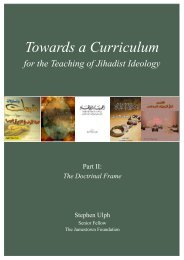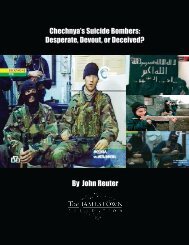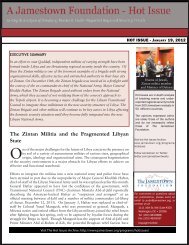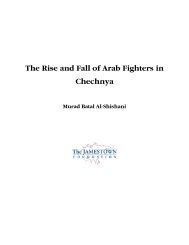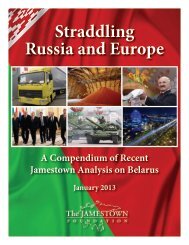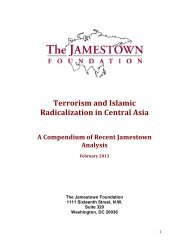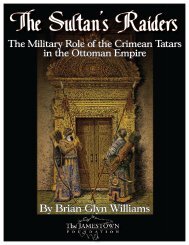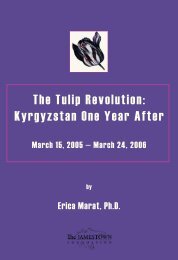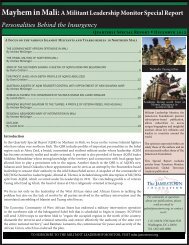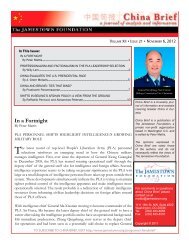The Chechen Resistance: Yesterday, Today and Tomorrow
The Chechen Resistance: Yesterday, Today and Tomorrow
The Chechen Resistance: Yesterday, Today and Tomorrow
- No tags were found...
Create successful ePaper yourself
Turn your PDF publications into a flip-book with our unique Google optimized e-Paper software.
<strong>The</strong> <strong>Chechen</strong> <strong>Resistance</strong>:<strong>Yesterday</strong>, <strong>Today</strong> <strong>and</strong> <strong>Tomorrow</strong>Mairbek Vachagaev
IntroductionIf we choose to ignore the earlier stages of <strong>Chechen</strong> resistance against Russian rule, then wemust look to the military campaigns of 1994-96 as the start of the current stage of the Russo-<strong>Chechen</strong> war. It was during this time of armed conflict when the foundations of thecontemporary resistance movement were formed.Since both were former Soviet officers, Dzhokhar Dudaev, the first president of Chechnya, <strong>and</strong>Aslan Maskhadov, the comm<strong>and</strong>er in chief of the General Council of the Military Forces of the<strong>Chechen</strong> republic of Ichkeria, initially worked to create military structures similar to that of theUSSR. Over time, however, the benefits of guerrilla warfare in facing one of the largestconventional militaries in the world have been demonstrated. This approach to warfare hasprevented Russia from exploiting its numerical advantage <strong>and</strong> has confused their forces byutilizing non-st<strong>and</strong>ard fighting techniques.<strong>Chechen</strong>s started to break with the organizational structure initially set up <strong>and</strong> supported byPresident Dudaev very early on in the 1994-96 campaign. This is what allowed them tosuccessfully resist against the occupation of all of Chechnya by Russian forces, as well as to beable to act decisively throughout the course of the war. B<strong>and</strong>s of guerrillas formed in ruralregions, city neighborhoods, <strong>and</strong> villages. <strong>The</strong>y acted autonomously, with only nominal highlevelcoordination between them in 1995. Only in 1996 did Aslan Maskhadov successfullymanage to start coordinating the <strong>Chechen</strong> forces, which helped to account for such seriousundertakings as the capture of Grozny. <strong>The</strong> capture of the capital was a seminal event that endedthis particular campaign <strong>and</strong> would have been impossible for uncoordinated groups to achieve.In the interwar period of 1997-99 President Maskhadov once again tried to form a conventionalarmy, but this force once again rapidly metamorphosed into the already familiar guerrilla form.This was most evident during the first real confrontation with the Russian military on TerekRidge in autumn of 1999. This, along with <strong>Chechen</strong> Defense Minister Magomed Khanbiev’sfailure to form a battle-worthy conventional force proved that the army had to adapt to theprevailing conditions, <strong>and</strong> led Maskhadov to completely change his viewpoint <strong>and</strong> radicallyoverhaul the organizational structure of his forces. It took two years to do this during the harshconditions of the Russian occupation, but the change was finally completed by July-August of2001 in the Nozhai-Yurt region of Chechnya when all the important high <strong>and</strong> mid-rankingmilitary comm<strong>and</strong>ers met for the first time after the ab<strong>and</strong>onment of Grozny.Leaders of the <strong>Chechen</strong> <strong>Resistance</strong>Following the charismatic Maskhadov, who had been elected in accordance with the rules ofEuropean democracy <strong>and</strong> had been confirmed as president by EU representatives, the presidencywas occupied for a short time by the young <strong>and</strong> relatively unknown Abdul-Khalim Sadulaev. Hewas the representative of a new generation of <strong>Chechen</strong> leaders who managed not only to becomethe leader of the <strong>Chechen</strong> resistance, but the leader of the entire resistance in the North Caucasus.He successfully combined the roles of a young fighter <strong>and</strong> a knowledgeable theologian, <strong>and</strong> thusavoided relying upon Middle Eastern emigrants. This fortuitous combination of skills allowedhim to be the first man since the death of Sheikh Mansur in 1794 to be the sole leader of theentire region, which is a region well known for rejecting most such leaders. Sadulaev combinedyouth <strong>and</strong> education, being a linguist who loved ancient philosophy <strong>and</strong> was a universallyrespected self-taught theologian. While Makhadov was seen by non-<strong>Chechen</strong> combatants as2
Now, upon the death of Sadulaev, Dokku Umarov holds the positions of President of the<strong>Chechen</strong> republic of Ichkeria, Emir of the Governmental Committee for Defense of the MadzhlisShura of the Caucasus, the Comm<strong>and</strong>er-in-Chief of the armed forces of Chechnya, <strong>and</strong> finallythe Emir of the Mujahadeen of the Caucasus. He is quite influential in the southwestern part ofChechnya, but he's not as popular in other regions of the republic. A follower of the Sufi Kadirtarikat <strong>and</strong> the Virdov brotherhood of Sheikh Kunta-Khadzhi, he's fully convinced that Islam inits traditional Sufi form should remain the basis of <strong>Chechen</strong> society.Umarov has been blacklisted by Russian authorities, with their security services holding himresponsible for many incidents, including: the abduction of an Interior Ministry representative,Chechnya General Gennadii Shpigun in March 1999; the separatists' attack on Ingushetia in June2004 <strong>and</strong> on Grozny in August of that year; as well as the hostage crisis in Beslan. 4 That said,similar accusations have been leveled at many other <strong>Chechen</strong> leaders by the Russian specialservices.<strong>The</strong> Social <strong>and</strong> Material Foundations<strong>The</strong> social background of the resistance movement has changed considerably during the years ofthe war. At the outset it contained a broad cross-section of society, including members of theintelligentsia. After a year or so, independent partisans <strong>and</strong> Islamic adherents began to dominatethe ranks <strong>and</strong> tried to actively shift the balance of power within the movement towards thosewith similar views. <strong>The</strong>se individuals tended to be from the mountainous parts of the republic aswell as those young people who sought to find the answer to their problems in religion. Many ofthose who supported <strong>and</strong> participated in the second campaign in 1999 have left, underst<strong>and</strong>ingthat a repeat of the events of the first war of 1994-96 is very much unlikely to happen.<strong>The</strong> movement is still popular among the general population, with perhaps the majoritysupporting it <strong>and</strong> applauding its successes. That said, the population must live in an environmentwhere there is massive pressure from both Russian <strong>and</strong> pro-Russian special services, <strong>and</strong> thusmust show their “neutrality” in public. Cases of blaming the separatists for someone else’s owncrimes have occurred.During the entire interwar period, those in charge of the republic <strong>and</strong> military leaders opposed tothe established leadership prepared for further combat. <strong>The</strong>y defined the enemy as either anexternal aggressor to be resisted, or the local government which needed to be overthrown. Somereservists were trained during this time, though the experiences of the first war had proven thatadequate manpower could be stored by simply having some <strong>Chechen</strong>s move into the mountains.<strong>The</strong> <strong>Chechen</strong> leadership <strong>and</strong> Aslan Maskhadov sought to create sufficient caches of weapons <strong>and</strong>ammunition in the mountains. With the capture of some important figures <strong>and</strong> the defection ofothers, many of these carefully hidden caches fell into the h<strong>and</strong>s of the Russian forces. This wasdespite the fact that most such depots were created in a semi-secret fashion, with onlyMaskhadov himself <strong>and</strong> two or three others per district knowing of their exact location.However, the locations of the depots created by the individual dzhamaats were known only totheir comm<strong>and</strong>ers, <strong>and</strong> thus often remained safe.Even all of these depots <strong>and</strong> caches would not have allowed for the separatists to survive as longas they have if it was not for the massive moral <strong>and</strong> material support provided by the generalpopulace. Some financial help has also been provided by those businessmen who are still trying4
to hedge their bets should the separatists come to power again, in which case they do not want tobe left out in the cold. <strong>The</strong> most significant financial support for the resistance comes from thosewho are members of international Islamic organizations that see the <strong>Chechen</strong>s as Muslim fightersin the region. But even here there are many difficulties, as Western banks have been studiouslytracking their account activity.<strong>The</strong> Ideological Underpinnings<strong>The</strong> ideological underpinnings of the resistance movement rest on the belief in the need forindependence from Russia. In the beginning, the <strong>Chechen</strong> leadership <strong>and</strong> almost all of themilitary comm<strong>and</strong>ers, excluding a few particularly odious figures among the Islamic radicals,such as Movladi Udugov, fully supported this idea. As the conflict has unfolded, however, thisnotion was gradually infused with Islamic ideas <strong>and</strong> terminology, mostly because the <strong>Chechen</strong>s’allies in their cause were gradually changing. At first, it was thought it would be possible to endthe war by having the democratic European nations apply pressure to the Russian government.However, over time it was seen that the Europeans viewed the <strong>Chechen</strong>s’ tragedy only throughthe lens of their own dependence on Russian energy resources. <strong>The</strong> new resistance leader DokkuUmarov has been a steadfast supporter of the idea of independence. It is reasonable to expectthat his pronouncements will focus first on the creation of the <strong>Chechen</strong> state, <strong>and</strong> only then onIslam, <strong>and</strong> only because it is the religion that is part <strong>and</strong> parcel of the <strong>Chechen</strong> ethnic identity.<strong>The</strong> earlier tendency to lean towards European democratic ideals has been replaced by the notionof "Islamic solidarity," which has not, however, been fully accepted by the entire <strong>Chechen</strong>movement, particularly due to the "betrayal" of Chechnya by certain leaders of Muslim countrieshas been clearly evident. <strong>The</strong> separatists have relied on a variety of Islamic organizations <strong>and</strong>foundations for financial help, while still making their pitch to both Western <strong>and</strong> Eastern leadersin order to support their cause. This meant that while dealing with European countries anemphasis was placed on the <strong>Chechen</strong> constitution, as it was built on Western values <strong>and</strong> ideals.This is despite the fact that it was heavily modified in 1996-1999, making it an entirely differentdocument. Conversely, when <strong>Chechen</strong> leaders made their pitch to Middle Eastern governments,they emphasized the fact that the <strong>Chechen</strong>s intended to build an Islamic state. This was madenecessary by the need to find allies wherever possible, but also elicited a heavily negativeresponse in the West. Even so, it has been necessary for the resistance to find real allies insteadof relying on the mostly theoretical help from Europe.<strong>The</strong> Dzhamaat as a Structure of the <strong>Resistance</strong> Movement<strong>The</strong> dzhamaat is currently the most battle-tested aspect of the resistance movement, <strong>and</strong> it hasrepresentatives from all over the republic. While the dzhamaat could only be found in thefoothills of the Black Mountains during the first war, the second campaign has seen its influencespread throughout Chechnya. Originally founded by Sheikh Fatkhi, while it still retains some ofits individuality <strong>and</strong> autonomy, it is still almost completely a part of the military forces of theresistance. <strong>The</strong> dzhamaat has certainly not been constant <strong>and</strong> homogenous, having givenwholehearted cooperation to the leaders of the regime during the reign of President Sadulaev,while cooperating only in order to preserve itself from full isolation from all other possible alliesduring the time of the Akhmadov brothers <strong>and</strong> Arbi Baraev. In this latter case cooperation hasbeen coerced, which is a fact that the leadership has always had to keep in mind.5
<strong>The</strong>re is currently a danger that under the influence of old dzhamaat leaders such as Abdul-MalikMezhidov <strong>and</strong> Usman Akhmadov, the question of rehabilitating those dzhamaat groups that hadbeen accused of acting against the <strong>Chechen</strong> resistance leadership would be raised once more.This occurred in the summer of 1998 in Gudermes when several detachments under SulimYamadaev, later supported by many respected <strong>Chechen</strong> comm<strong>and</strong>ers, clashed with units of theSharia Guards <strong>and</strong> the Islamic Special Forces Regiment. <strong>The</strong> rehabilitation question has beenraised frequently, <strong>and</strong> at the start of the second war dzhamaat members actually dem<strong>and</strong>ed thatAslan Maskhadov repeal the orders outlawing the activity of the radical dzhamaat groups.Despite this, neither Maskhadov nor Sadulaev have ever repealed the orders banishing <strong>and</strong>outlawing these groups. This refusal to make concessions suggests that the leadership thinks thatit currently has the upper h<strong>and</strong>, <strong>and</strong> that a majority of public support no longer comes through thedzhamaat groups. <strong>The</strong> situation in Pankisi suggests that almost everyone wants to deal with themain resistance leader, instead of the ambitious <strong>and</strong> ill-defined local dzhamaat comm<strong>and</strong>ers whohad moved outside of <strong>Chechen</strong> territory. <strong>The</strong>y often did this so as to control the delivery of aid,<strong>and</strong> thus make themselves an important factor in the resistance once again.<strong>The</strong> demographics of the dzhamaat have also changed. <strong>The</strong> initial glut of young men who likedthe uniforms, the money, <strong>and</strong> a sort of mystique that came with being opposed to those in chargehave been replaced by those who know what the dzhamaat is <strong>and</strong> who it represents. It no longerrepresents young men who were taken with the élan that these forces represented. Thus, it isnow filled with those who are able to ideologically defend their ideas, obey their leaders, <strong>and</strong> arecapable of overcoming <strong>Chechen</strong> traditions without any real difficulty. This is crucial, sincemany men were unable to ab<strong>and</strong>on their loyalty to <strong>Chechen</strong> traditions <strong>and</strong> customs no matterwhat happened.In a sense the relationship between the dzhamaat <strong>and</strong> the <strong>Chechen</strong> republic is yet unclear.Because of the occupation by Federal Russian forces this question is not currently relevant, butthe question has been delayed by the current situation. <strong>The</strong>re's a significant chance that this issuewill split those who fight against Russia today. <strong>The</strong> people who will most probably foment sucha schism are those who are now living outside of Chechnya, but still trying to remain politicallyrelevant.<strong>Chechen</strong> Dzhamaats in Russia<strong>The</strong> form of social organization implicit in the dzhamaat is now irreversibly present in the entireof the Russian Federation. Moscow <strong>and</strong> other large cities have dzhamaats that unite <strong>Chechen</strong>s<strong>and</strong> Ingush, as well as other North Caucasian nationalities. However, the typical dzhamaat isgenerally formed along narrow ethnic lines so that people who are separated from theirhomel<strong>and</strong>s can come together in order to share their ideas <strong>and</strong> feelings. <strong>The</strong>se are not terroristorganizations <strong>and</strong> are not organized in order to act against the state, but are diaspora groups thatdo not wish to affiliate themselves with those who officially proclaim the pro-Russian inclinationof the <strong>Chechen</strong> youth. In many respects, these dzhamaats are very different, as the members areoften well educated or still studying in colleges <strong>and</strong> universities. <strong>The</strong>y do not accept theprinciples of the Kadyrov administration <strong>and</strong> often create websites that sharply condemn thosewho cooperate with Kadyrov <strong>and</strong> Alkhanov.It is often these groups that are targeted by the Russian special services, since it's assumed thatthey are part of those dzhamaats that are actually fighting in the North Caucasus. This inabilityof the Russian government to distinguish between these more missionary-style dzhamaats <strong>and</strong>6
the radical dzhamaats that are actually part of the rebellion often promotes the feelings ofalienation <strong>and</strong> bitterness that lead to their gradual association with the genuinely radical <strong>and</strong>militant dzhamaats.It should be remembered that dzhamaats are ethnically heterogeneous. <strong>The</strong>re are groups formedby Dagestanis, Tatars, Bashkirs, even ethnic Russians who have converted to Islam, whichmakes the dzhamaat not a purely <strong>Chechen</strong> concept. Even the label itself of "<strong>Chechen</strong>" or "Tatar"generally depends on the ethnic background of the group's founder. <strong>The</strong> largest dzhamaats existin Moscow, in the Urals, the Volga region, <strong>and</strong> in Siberia, where people have experienced plentyof hostile treatment from a suspicious government. <strong>The</strong>se victims of the authorities in theseplaces seek to change the entire social structure, particularly since the government sees thesedzhamaats as solely structures that fights Moscow's rule in Chechnya itself.<strong>The</strong> young members of the dzhamaats have created many websites that reflect their emotions <strong>and</strong>proselytize Islam in the only form underst<strong>and</strong>able to them – the Salafi school. <strong>The</strong>y alsocondemn the followers of Sufism <strong>and</strong> the official clergy who, according to them, undermineIslam as a religion through their unislamic behavior.Foreigners in the <strong>Resistance</strong> MovementToo much emphasis has been placed on the presence of foreigners in the <strong>Chechen</strong> resistancemovement. <strong>The</strong> Russian authorities often use this to show a link between the resistance <strong>and</strong>international terrorism. <strong>The</strong> first international volunteers appeared in Chechnya in 1995, havingarrived from Tajikistan after the beginning of the war. One of the first was Sheikh Fatkhi (a<strong>Chechen</strong> from Jordan) <strong>and</strong> Emir Khattab (an Arab from Saudi Arabia). <strong>The</strong> former created thefirst dzhamaat for non-<strong>Chechen</strong> combatants <strong>and</strong> put forth an example emulated by all otherdzhamaat groups that have sprung up in the republic. <strong>The</strong> latter became the founder of theforeign fighters' battalion within the <strong>Chechen</strong> military. Fatkhi's dzhamaat became very popular<strong>and</strong> many <strong>Chechen</strong>s enlisted into it. Khattab’s battalion, meanwhile, was a structure that wasgenerally composed of non-<strong>Chechen</strong> nationals. In a training camp built next to Avtur village,representatives of almost all ethnic groups of the former Soviet Union trained under the directionof instructors provided by Khattab. <strong>The</strong>se instructors had entered Chechnya in 1996 <strong>and</strong>generally came from Yemen <strong>and</strong> Saudi Arabia. Here they trained their charges not only inmilitary maneuvers, but also in the basics of Salafite Islam.Khattab's role later shifted, <strong>and</strong> he provided financial support for his training camp <strong>and</strong> hisimmediate supporters. While it's often alleged that Khattab was a leader of the Salafites inChechnya, he always indicated that his job was purely military, <strong>and</strong> that he did not deal withpolitics or religion. It would have been impossible to acquire funding from across the wholeworld without some ideological base, but President Maskhadov recognized Emir Khattab'sneutrality in 1998 after the Sufi-Salafi conflict. In fact, Khattab <strong>and</strong> his comrades were amongthe few foreigners not ejected from the republic on the president's orders. 5By the start of the second military campaign, foreign fighters composed only a small portion ofthe total military strength of the resistance. Many left in 2000, believing that staying wastantamount to suicide. Many romantically-inclined younger men who had come to help the<strong>Chechen</strong>s were stopped at the Russian border <strong>and</strong> the long wait necessary to sneak across theborder disappointed them, which led them to leave Georgia or Azerbaijan having never set footin Chechnya. While websites worldwide called for aid to the <strong>Chechen</strong> mujahadeen, this was7
often simply PR with no real substance to it. After 2001 most foreigners became middlemenwho connected the <strong>Chechen</strong> combatants with those who helped to finance their actions fromabroad.Is <strong>The</strong>re an Al-Qaeda Connection?<strong>The</strong> events of September 11 th , 2001 in New York City became a genuine holiday for the Russianmilitary leadership, since it saw this disaster as cause for a change in Washington's positionregarding Chechnya. In order to make the situation clearer for the Americans, serious effortswere made to link the <strong>Chechen</strong> movement to Osama bin-Laden. Thus, Russian special serviceforces would conveniently find disks showing how <strong>Chechen</strong> fighters had studied flying, or wouldfind cassettes in Arabic discussing the American tragedy.<strong>The</strong> <strong>Chechen</strong> leadership was completely unaware of al-Qaeda's existence, <strong>and</strong> tried to underst<strong>and</strong>what sort of organization it actually was. Aslan Maskhadov officially dem<strong>and</strong>ed a clarificationfrom his press secretary, since neither he, nor most of the <strong>Chechen</strong> fighters knew anything aboutthis organization before the whole world learned of it in September 2001.<strong>The</strong> American operation in Afghanistan, where the Russian leadership also hinted of a <strong>Chechen</strong>connection, did not yield positive results, since no <strong>Chechen</strong>s were killed or captured. JournalistAndrei Babitskii from Radio Freedom <strong>and</strong> Sofi Shikhab from Le Monde also searched for anytraces of <strong>Chechen</strong> involvement, <strong>and</strong> concluded that it was pure propag<strong>and</strong>a.Since then, there has not been even a single shred of evidence demonstrating any cooperationbetween al-Qaeda <strong>and</strong> the <strong>Chechen</strong> resistance, even through foreign intermediaries. Al-Qaedanever saw Chechnya as a front line of struggle the Muslim world, never saw the <strong>Chechen</strong>s asallies, <strong>and</strong> never even sought to infiltrate the republic. Iraq, Palestine, <strong>and</strong> certainly Afghanistanwere much more important to al-Qaeda’s interests. It's significant that the deaths of presidentsMaskhadov <strong>and</strong> Sadulaev, <strong>and</strong> even that of such a pan-Islamic figure as Shamil Basayev, did notelicit a single word of condolence from al-Qaeda representatives. Such total silence is probablythe best indicator of the lack of any meaningful connection between the <strong>Chechen</strong> resistancemovement <strong>and</strong> this terrorist organization.<strong>The</strong> Media of the <strong>Chechen</strong> <strong>Resistance</strong> Movement<strong>The</strong> most widely available <strong>and</strong> most popular media outlets for the resistance are internetpublications. <strong>The</strong> most important of these are “<strong>Chechen</strong>press” (Ahmad Zakaev) <strong>and</strong> “Daymohk”(the administration of the president of the <strong>Chechen</strong> Republic of Ichkeria), with the latteressentially being the main website of the <strong>Chechen</strong> president, <strong>and</strong> originally created as acounterpoint to “<strong>Chechen</strong>press,” which operated as an anti-presidential site during Maskhadov'stime. <strong>The</strong>re are also websites of a totally different nature, including those of social organizationsthat support the uprising or even personal sites advocating the principle of <strong>Chechen</strong>independence. <strong>The</strong>se include “Caucasuslive” (the “Svobodnyi Kavkkaz”-“Free Caucasus”journalistic collaboration of Ahmad Sardali <strong>and</strong> Khazman Umarov) <strong>and</strong> “<strong>Chechen</strong>times” (ZakharAbukhanov).<strong>The</strong>re are several dozen individually run youth websites on which young men <strong>and</strong> women livingoutside Chechnya try to express their views on the events occurring in their homel<strong>and</strong> <strong>and</strong> showtheir support for those fighting for <strong>Chechen</strong> freedom. <strong>The</strong>se sites are geared towards a young8
audience <strong>and</strong> feature musical clips, chat rooms, <strong>and</strong> so forth. Websites geared towardsintellectuals calling for <strong>Chechen</strong> independence are far <strong>and</strong> few between, with the largest beingwww.chechen.org (Mairbek Vatchagaev), which focuses on scholarly materials written onChechnya <strong>and</strong> the <strong>Chechen</strong> people, as well as www.zhaina.com, which features <strong>Chechen</strong>literature.<strong>The</strong>re are also Islamic-themed sites that also advocate independence, generally providingmaterials about the ideological underpinnings of jihad <strong>and</strong> the need for an Islamic state. <strong>The</strong>seinclude ww.alqoqaz.net (<strong>Chechen</strong> jihad, in Arabic) <strong>and</strong> "Kavkazcenter" (Movladi Udugov), withthe latter claiming to be a pan-Islamic publication that devotes a great deal of space to news fromAfghanistan, Iraq, Lebanon, <strong>and</strong> Palestine.Newspapers like Ichkeria, <strong>Chechen</strong>times <strong>and</strong> others have disappeared, including those that hadbeen published up to 2003. With the arrest of couriers in Chechnya this form of media has hadto be ab<strong>and</strong>oned. <strong>The</strong>y have largely been replaced by the internet publications mentioned above,although many of these are not very professional, featuring music clips <strong>and</strong> scenes of violenceright next to each other. This is probably because many of them are created by young peoplethat not only show their solidarity with the cause of independence, but also embrace that whichgenerally attracts contemporary youth – music, bulletin boards, <strong>and</strong> chat rooms.<strong>The</strong> Political Wing of the <strong>Resistance</strong><strong>The</strong> politicians of the <strong>Chechen</strong> resistance movement are not particularly numerous, <strong>and</strong> areconfined to a few well-known names, with the palette of different viewpoints being rather scanty.<strong>The</strong>re are a few different camps, the first being the “traditionalists,” or those who want to build astate on democratic principles, which may be slightly modified in order to take account of ethnictraditions (Ahmad Zakaev, Umar Khanbiev, Apti Bisultanov, Said-Hasan Abumuslimov, SelimBishaev along with a cadre of <strong>Chechen</strong> parliamentarians). <strong>The</strong>re is also a second, “radical”position that envisions the future state as being founded solely on Islamic principles as seen bythe Salafi school.<strong>The</strong> existence of these two camps has long been suspected, but in the past they felt it was unwiseto publicize this division during the heat of war. <strong>The</strong> issue came to light when Movladi Udugov,one of the original proponents of the “radical” approach, published an article entitled “AMujahadeen's Thoughts” on his website “Kavkazcenter” <strong>and</strong> argued for the many positiveaspects of a strictly Islamic approach to state-building. <strong>The</strong> argument was presented in such away as to seem to be the view of all <strong>Chechen</strong>s, which surprisingly led to Ahmad Zakaev puttingforth a counter-argument. Without directly criticizing Udugov, he noted that the <strong>Chechen</strong> peoplehave other paths to future development, <strong>and</strong> that such a decision needs to be taken by the entiretyof the <strong>Chechen</strong> nation.This discussion of post-war possibilities ended the taboo against criticizing the <strong>Chechen</strong>leadership, with all <strong>Chechen</strong> media outlets dividing into either the pro-Udugov <strong>and</strong> pro-Zakaevcamps. <strong>The</strong> radical wing has generally been much more aggressive in its arguments about postwar<strong>Chechen</strong> society, <strong>and</strong> has framed all traditionalist initiatives as potential capitulation beforethe Russian government. <strong>The</strong>y have frequently called for the top leaders to step in <strong>and</strong> makeclarifications about particular issues, <strong>and</strong> have often backed their arguments with the Koran <strong>and</strong>Islamic scholarship, making successful counter-arguments difficult.9
All of this means that a coherent political wing of the <strong>Chechen</strong> resistance has not yet beenformed, with no one being genuinely willing to carry this burden. <strong>The</strong> two competing parties,one agitating for a secular state <strong>and</strong> the other for an Islamic polity, have not yet settled theirdifferences, which is painfully apparent. It's notable that Ahmad Zakaev is a very importantcounterweight to the Islamists, <strong>and</strong> has tried to bring together all those who share his point ofview. That said, many who find Zakaev an intolerable political figure have generally affiliatedthemselves with those dem<strong>and</strong>ing an Islamic state in post-war Chechnya. Thus, there is nosingle force that can act as the unifying political component of the resistance movement.Furthermore, there is a sense that political unity is often surpassed by the notion that “the manwith the rifle will decide,” meaning that the destiny of post-war Chechnya is being put off untilthe end of conflict with the Russian Federation.<strong>The</strong> <strong>Chechen</strong> <strong>Resistance</strong> Movement after the Death of Shamil Basayev<strong>The</strong> death of this critical <strong>and</strong> odious figure of the resistance can only create a certain amount ofdisorientation. Shamil Basayev acted as the coordinator of all the armies of the NorthernCaucasus. His authority was unquestioned, especially in the two b<strong>and</strong>s that were initially part ofhis own units – the Nogai battalion <strong>and</strong> the Ingush dzhamaat. Following the 2001 flight ofMahomed Kebedov (often known as Muhammad Kizilurtovskii, the spiritual leader of allDagestani Salafites) to Istanbul, Basayev became the virtual military leader of the Dagestanidzhamaat. While never completely controlled by Shamil Basayev, this dzhamaat, named“Shariat,” was in close contact with him both while it was quartered in Chechnya in 1999-2000,<strong>and</strong> even later after it had moved back to Dagestan.Basayev <strong>and</strong> several of his comrades from Kabardino-Balkaria formed the “Yarmuk” dzhamaatthere. Though originally considered a primarily Balkar group, it was actually mostly composedof Kabardins. This showed Basayev's skill in organizing a dzhamaat in what was ostensibly themost stable <strong>and</strong> pro-Russian republic of the North Caucasus; a place where many Russians cameto vacation. <strong>The</strong> fact that both Kabardins <strong>and</strong> Balkars are particularly non-observant Muslimsmade this a low-risk area for the Russian government (comparable to Adygea), making thewhole task even harder.Another never fully-completed goal was the organization of a dzhamaat in Karachaevo-Cherkessia. This was made difficult by the fact that even though the republic was home to oneof the oldest dzhamaat groups in the USSR, the dzhamaat had shifted over time from political tomissionary activity. Furthermore, its leader <strong>and</strong> founder of the local branch of the IslamicRenaissance Party, Magomed Bedzhiev, had left for Moscow <strong>and</strong> had lost touch with hisfollowers. It was only with the start of the second <strong>Chechen</strong> war that the dzhamaat once moreshowed itself <strong>and</strong> entered the debate over the role of Islam in the republic. Building upon thisevent, it was possible to find those who had already fought in Chechnya (there were only a few,but several of these had passed through Khattab's training camps) <strong>and</strong> thus further build thedzhamaat. It is still impossible to say how complete the process is by this point, though it'scertain that seeds have been planted that will eventually grow into a new problem for the Russianauthorities.Thus the Nogai, Ingush, Dagestani, Kabardino-Balkar, <strong>and</strong> quite possibly the Karachaevo-Cherkess dzhamaats form one overarching structure that has been designed specifically in orderto maximize the damage to Russia's interests in the region. <strong>The</strong> goal of the <strong>Chechen</strong>s, including10
Dokku Umarov, is to build on Shamil Basayev's legacy by ensuring that these groups retain aunified front against the Russian troops in the area.Plans for Exp<strong>and</strong>ing the Armed <strong>Resistance</strong> Further into RussiaBasayev's strategy encompassed the whole region, <strong>and</strong> he was probably the creator of the socalledCaucasus Front that was officially created by president Sadulaev after Maskhadov's deathon May 5 th , 2005. <strong>The</strong> Caucasus Front is part of the Armed Forces of the <strong>Chechen</strong> Republic ofIchkeria <strong>and</strong> is comm<strong>and</strong>ed by Emir Abu-Muslim. It was comprised of divisions from thesefollowing regions: Adygea, Ingushetia, Kabardino-Balkaria, Karachayevo-Cherkessia, KrasnodarStavropol (which moved them out of the Western Front), <strong>and</strong> the reconstituted Ossetian sector.<strong>The</strong> dzhamaats were also included into the Caucasian Front, with the “Shariat” group becomingpart of the Dagestani Front. Two months later, in August 2005 “<strong>Chechen</strong>press” reported thatfield comm<strong>and</strong>ers had agreed to, “create a unified intelligence <strong>and</strong> counter-intelligenceorganization of the Caucasian Front using the appropriate structures of the <strong>Chechen</strong> Republic ofIchkeria.” Thus, <strong>Chechen</strong> political structures are gradually becoming regional structures, whichprovides a successful example of a pan-ethnic, pan-republican entity that the Russiangovernment has long been unable to create in the Northern Caucasus.But even this seemed insufficient for Basayev, <strong>and</strong> shortly after his death Dokku Umarov usedthis concept in the creation of two new fronts – the Ural Front <strong>and</strong> the Volga Front. 6 One mayask if this is a joke, or does the <strong>Chechen</strong> leadership actually have the ability to create two newfronts deep inside Russian territory? It's still impossible to say. First of all, one shouldremember that the idea of the Caucasus Front was also initially greeted with great skepticism.Secondly, although the idea does have its propag<strong>and</strong>a purposes, a real, if weak, foundation mightexist for its successful execution. <strong>The</strong>se regions do have non-military dzhamaats, although thatcan be changed very quickly, as Kabardino-Balkaria <strong>and</strong> Karachaevo-Cherkessia show. <strong>The</strong>fronts have been created outside the central regions of Russia in areas with large minoritypopulations, including the independently-minded Tatars <strong>and</strong> Bashkirs. While it's unlikely thatthe Tatars are ready to dem<strong>and</strong> their independence today, something of which the Kremlin iswell aware, that has still not stopped the creation of regional divisions for Counter-Extremism<strong>and</strong> Anti-Separatism Activity, headed by FSB director Patrushev, in all these republics. <strong>The</strong><strong>Chechen</strong>s are effectively becoming a force that can be the foundation for striking serious blowsagainst Russia in the most unexpected places <strong>and</strong> regions.Russia Admits that <strong>Today</strong> it is Fighting ProfessionalsFSB director Patrushev has recently declared that one federal <strong>and</strong> several dozen regionaloperations headquarters will be created across Russia within the framework of the National Anti-Terrorist Committee. In light of President Putin's statements about general peace <strong>and</strong> tranquility,the security chief's actions suggest that Moscow is actually very concerned about the threatsposed by the attitudes of its citizens. <strong>The</strong> creation of these headquarters will unite numerousagencies <strong>and</strong> organs of the government, including the armed forces. This also readily hints at theconcerns of Russian politicians. 7 <strong>The</strong> fact that this is not a regional, but a countrywide effortsuggests instability exists in other regions. Even if it is not blatant separatist instability, it isnonetheless hard to conceal.In Chechnya itself, Russia's Interior Minister Rashid Nurgaliev has stated than the RegionalOperations Headquarters of the Northern Caucasus will be reorganized, with a headquarters11
established in each North Caucasian republic. 8 This is ostensibly being done in order to assure afaster response time to local disturbances created by the separatists. In reality, little has actuallychanged, since he then explained that he would be heading the <strong>Chechen</strong> headquarters himself.Essentially, despite the altered formula, the top men in the Russian security services are stillwatching Chechnya. This was merely a rotation of those in charge.This interaction between the security services has always been interesting for both academics<strong>and</strong> journalists. All operations are conducted in secret, meaning that other services learn of themmuch later, oftentimes from the media. <strong>The</strong> various arms of the government are often at oddswith each other. <strong>The</strong> Ministry of Internal Affairs is cool towards the military, everyone dislikesthe FSB, the GRU is always at odds with the FSB despite their similar duties, the military fears<strong>and</strong> dislikes Kadyrov's men, who in turn fail to hide their loathing for the military. With such anarrangement it's clear that Moscow is periodically forced to rotate those in charge. <strong>The</strong> AttorneyGeneral has long ceased being an organ of justice in Chechnya, <strong>and</strong> instead works to concealnumerous crimes against humanity. <strong>The</strong> courts have shown how politicized they are by findingpeople who have confessed to killing peaceful <strong>Chechen</strong>s innocent.“<strong>The</strong> south of Russia has seen a growing wave of especially despicable crimes. Thous<strong>and</strong>s ofcriminals evade justice,” declared Yurii Chaika, the Attorney General of the Russian Federationat an inter-ministry meeting concerning security in the Southern Federal District on Friday. Hestated that, “terrorism, kidnapping, <strong>and</strong> associated crimes are the most severe problem.”According to Chaika these crimes are, “the most serious factor that leads to instability inDagestan, Ingushetia, <strong>and</strong> Chechnya. Terrorist acts on the Makhachkala-Buinaksk road showthat our enemy is both strong <strong>and</strong> very dangerous. Every tenth crime in southern Russia is linkedto illegal weapons.” 9 Finally, the head of the Ministry of Internal Affairs of Ingushetia hasadmitted that 170 guerrillas were eliminated there, thus proving that the Ingush dzhamaat hasbetween 100 <strong>and</strong> 200 members. 10Islam as a Part of the Kremlin's Pressure on the Region's InhabitantsMoscow is once more attempting to tightly control the spread of Islamic ideology in theproblematic Northern Caucasus. Events in Chechnya <strong>and</strong> the spread of armed conflict across thewhole area confront the Russian government with the same problems that were present duringthe Soviet period. This means that the state seeks to subjugate all of the structures of Muslimsociety <strong>and</strong> isolate, as far as possible, the Muslims of the Russian Federation from all foreigncontacts. <strong>The</strong> Russian government sees the activities of various Islamic foundations <strong>and</strong>humanitarian organizations as being contrary to Russia's well-being.<strong>The</strong> muftis of the Northern Caucasus, represented by the Coordinating Center for Muslims of theNorthern Caucasus (its head, serving his second term, is the mufti of Karachaevo-Cherkessia <strong>and</strong>Stavropolskii Krai, Ismail-khadji Berdiev) raised the question of Islamic education in the regionduring a meeting with Dmitrii Kozak, the Presidential Representative in the Southern FederalDistrict. 11 It was expected that the Russian government would make concessions to the officialMuslim religious leaders in exchange for their loyalty to the Kremlin's Caucasus policy. <strong>The</strong>seexpectations seem to have been accurate. Recent events in the Northern Caucasus (particularlythe <strong>Chechen</strong> wars of 1994-1996 <strong>and</strong> 1999-2006) have forced the Kremlin to try differentapproaches to solving the problems posed by Islam. This specifically means trying to place allthe religious leaders (imams, mullahs, theologians, etc.) under strict control. <strong>The</strong> wars inChechnya have shown that Moscow has lost ground in this effort compared to the Soviet period,12
when the only Islamic institute in the whole country was in Tashkent, the only madrasah waslocated in Bukhara, the only religious council was in Ufa, <strong>and</strong> the almost complete lack ofmosques made it easy for the KGB to track those who refused to embrace atheism.With the fall of the USSR, the post-Soviet countries were quickly filled with Islamicmissionaries from the Middle East <strong>and</strong> Turkey, many of whom tried to influence political eventsin Muslim-heavy regions of the Russian Federation. Starting in the 1990's <strong>and</strong> up to 2000, forexample, the Ministry of Justice of the Russian Federation officially registered <strong>and</strong> permittedunfettered activity for a variety of Islamic foundations <strong>and</strong> organizations. <strong>The</strong>se organizationsincluded a branch of the League of the Islamic World, a regional bureau of the World MuslimYouth Assembly, the Russian foundation “Ibrahim ben Abd al-Aziz al-Ibrahim” (based in SaudiArabia), a branch of the humanitarian organization “International Humanitarian Call” (from theUAE), a branch of the scientific society “A Commission for the Study of Scientific Signs in theKoran <strong>and</strong> the Sunnah,” <strong>and</strong> a branch of the humanitarian organization “Islamic Relief.” 12According to other sources, Al-Haramein, a Saudi foundation, <strong>and</strong> IHH, a Turkish organizationwere also active in the region. Not only were all of these groups officially registered <strong>and</strong>accredited in Moscow, but several of them had regional offices across the Northern Caucasus incities such as Mahachkala, Nalchik <strong>and</strong> Maikop. 13Since none of these entities managed to get reaccredited by the Russian Ministry of Justice insubsequent years, numerous educational institutions ceased to operate. After officialgovernmental inquiries, steps were taken to eliminate the following: <strong>The</strong> International Dagestani-Turkish College <strong>and</strong> its branches, the Karachaevo-Cherkessia Turkish Lyceum, the IslamicInstitute of Kabardino-Balkaria, an Arabic language school in Ingushetia, the Al-Fatkh madrasahin Udmurtia, <strong>and</strong> the Rasul Akram college in Moscow, among others. 14 All Islamic institutionsin Chechnya were also shut down. Overall, the Northern Caucasus was home to more than twodozen Islamic institutes, up to 200 madrasahs, <strong>and</strong> numerous maktabas (Koranic study schools),which were available at almost every mosque. 15Recent statements made by Kozak are interesting for several reasons. First of all, the creation ofa new regional university was mentioned, which was later modified by the muftis to the creationof two universities, since the population of the Northern Caucasus is split between two schools –the Shafii <strong>and</strong> the Hanafi. Chechnya, Ingushetia <strong>and</strong> Dagestan are all aligned with the former,while the Muslims of North Ossetia, Kabardino-Balkaria, Karachaevo-Cherkessia <strong>and</strong> Adygeaare partisans of the latter. 16<strong>The</strong> necessity of creating religious institutions of higher learning isn't new. This has been thecase for as long as 15 years. <strong>The</strong> 1990's saw a boom of in the building <strong>and</strong> repair of mosques.While the Union of Religious Affairs indicated that in 1985 there were only 47 mosques in theregion (27 in Dagestan, 12 in <strong>Chechen</strong>o-Ingushetia, 8 in Kabardino-Balkaria), by 2000 Dagestanalone had 1,585, while Ingushetia had 200, Chechnya had 400 (in 1999), Kabardino-Balkaria had96, <strong>and</strong> Karachaevo-Cherkessia had 91 (both in 1997). Meanwhile, the first mosque was openedin the capital of Cherkess in 1999. During this time, Northern Caucasian society was simplyunable to provide a sufficient number of qualified religious personnel. In order to correct thisdeficit energetic young men were sent to study in the Middle East. 17A second important point made by Kozak during his meeting with the muftis was that auniversity was necessary in order to limit influence from overseas. As he put it, “it's necessary tostudy pure Islam, so that young people will not need to go find a place to learn it somewhere on13
the side.” 18 This suggests that this university would be created in order to counteract theinfluence of the Islamic centers of the Middle East, thus pushing those wishing to learn into aninstitution where the control of the Russian state could be so strong as to reduce the quality of theeducation offered.From 1996 to 1998 up to 1,500 Dagestanis studied abroad. 19 In 1998 hundreds of students fromKabardino-Balkaria <strong>and</strong> Karachaevo-Cherkessia also studied abroad (with Karachai <strong>and</strong> Balkarstudents generally choosing Turkey because of the favorable conditions extended by its religiouscolleges to Turkic-speaking students), <strong>and</strong> thous<strong>and</strong>s of <strong>Chechen</strong>s were studying in the MiddleEast, Pakistan <strong>and</strong> Malaysia. Before opening such a university, Kozak noted, it is necessary to,“first determine the educational program of these future colleges, <strong>and</strong> only then discuss theplacement of such colleges.” 20 This suggests that the state would have a voice in what is taught,who is taught, <strong>and</strong> how the teaching is done in such an Islamic university.According to the deputy mufti of Chechnya, Magomed-Sharip Dadaev, the republic currently haseighteen functioning madrasahs, three of which were opened this past August. One of them is inDuba-Yurt (the foothills), another is located in Veduchi (the highl<strong>and</strong>s), <strong>and</strong> the third is in Naur(beyond the Terek), 21 which demonstrates the spreading influence of Islamic training across thewhole republic, including those regions earlier thought to be cool towards Islam.Finally, there is the question of actually reestablishing the office of unified head mufti of theNorthern Caucasus through the institution of the Coordinating Center for Muslims of theNorthern Caucasus. Though the Center has been located in Moscow since its inception in 1998,there has been talk of moving it to Mineralnyi Vody, in Stavropolskii Krai. This is not anaccidental choice since the city is centrally located within the Caucasus region <strong>and</strong> is thusgeographically very convenient. That said, this site would be a serious concession by theMuslims of the North-East (Ingushetia, Chechnya, Dagestan), who had hoped to once more makeDagestan the center of Islam in the region, just as it had been during the Soviet period.<strong>The</strong>re is also the matter of whether this organization should be in existence at all, which is aquestion raised by the muftis of Ingushetia, Chechnya <strong>and</strong> Dagestan following the resignation ofIngush mufti Mahomed-khadji Albogachiev as president of the Center. Having lost thepresidency <strong>and</strong> also the location of the organization's headquarters they might question the needfor the existence Center, <strong>and</strong> thus use the office of unified head mufti instead.In fact the collapse of the former Spiritual Board of the Muslims of the Northern Caucasusoccurred in 1989 precisely because it lost the support of Dagestan <strong>and</strong> Chechnya. <strong>The</strong> formerhead mufti, Mahmud-khadji Gekkiev, a Balkar, was physically ejected from the headquarters ofthe Board <strong>and</strong> was accused of being a Hanafi (from the northwest), <strong>and</strong> thus unable to representthe northeastern Shafii Dagestan, Chechnya <strong>and</strong> Ingushetia.While today's Russian authorities may be able to repeat the actions of the Soviet government, it'spossible that the results will end up being the same as those seen in the 1980's <strong>and</strong> 1990's.14
"<strong>Chechen</strong>" has Become Synonymous with "Enemy" for the Typical RussianMoscow has learned its lessons from the first military campaign during which Chechnya'sneighbors actively aided it, <strong>and</strong> this time it has taken pains to neutralize the Dagestanis, Ingush,<strong>and</strong> Kabardins.<strong>The</strong> campaign of Muslim b<strong>and</strong>s in Dagestan in 1999 was characterized by the Russiangovernment as an attack by the <strong>Chechen</strong>s on Dagestan, even though the first forces to attackwere from the Dagestan dzhamaat led by Bagaudin Kizilurtovskii. <strong>The</strong> whole campaign actuallyraised many questions, but provided very few answers (Shermatova, Sonabar. “<strong>The</strong> IslamicFactors in the H<strong>and</strong>s of the Political Elites.”) 22In Ingushetia, the Russian authorities had to contend with the position of former president R.Aushev, who had long blocked the spread of all anti-<strong>Chechen</strong> attitudes promoted by Moscow.("Echo Moskvy" radio broadcast, 9/15/05).Kabardino-Balkaria also saw endless rumors of how <strong>Chechen</strong> refugees were filling up the resortsof the republic, thus promoting unfriendly relations <strong>and</strong> contributing to mass street fights thattook place between <strong>Chechen</strong> <strong>and</strong> Kabardin youth.<strong>The</strong> mechanism of violence was so well-established that the creation <strong>and</strong> operation ofconcentration camps in Chernokozovo, Tolstoi-yurt, Grozny, <strong>and</strong> Urus-Martan was presented asan effective measure by the authorities up until 2002. Shootings took place in humanitarianzones. <strong>The</strong>re were police operations in which old men, women, <strong>and</strong> children were killed (as inAldy, 02/05/00 <strong>and</strong> Kotyr-yurt <strong>and</strong> Alkhan-yurt). 23 Torture was used in Chernokozovo thatseemed to harken back to the conquest of the <strong>Chechen</strong>s in the 18 th <strong>and</strong> 19 th centuries. 24Russian authorities in Chechnya have a groupthink mentality that portrays every <strong>Chechen</strong> as anenemy. In fact, the chief Russian army comm<strong>and</strong>er in Chechnya, General Shamanov, declaredthat even an unborn child in this region is a potential terrorist. This all points to evidence of aningrained illness of Russian society. It's hard to imagine how President Putin could try to act asthe equal of the leaders of the developed nations in the G-8 given this attitude.<strong>The</strong> image of the <strong>Chechen</strong> as an enemy is so strong that even propag<strong>and</strong>a to the contraryundertaken by Vladislav Surkov, one of the most influential members of Putin's administration,is unlikely to bear much fruit. Every month people can see movies in which the <strong>Chechen</strong> isshown as the enemy of the Russian state, which leads to the assumption that <strong>Chechen</strong>s areinherently harmful to their interests. <strong>Chechen</strong>s doing business in Russia always provokeinquiries from the security services, making it necessary for almost all businessmen to hirepeople of Slavic background to be the public face of their enterprises.This is not just the case in Russia. Even the French Foreign Ministry has officially prohibited<strong>Chechen</strong>s from entering the country. It seems only a matter of time until other European statesfollow suit.Yet while Russian propag<strong>and</strong>a has tried to push its own version of the events that are takingplace in Chechnya, it has not been really successful in this endeavor. Most seem to have thegeneral opinion that the <strong>Chechen</strong>s are generally victims of a vicious crime, <strong>and</strong> not members of aglobal terrorist organization.15
We must study history so that this war will be a lesson that prevents others like it from takingplace in the future.<strong>The</strong> Role of the <strong>Chechen</strong> Diaspora in Western Political Life<strong>Today</strong>, the <strong>Chechen</strong> diaspora has a growing role in the establishment of a larger <strong>Chechen</strong> society<strong>and</strong> nation. According to unofficial figures, there are 100,000 <strong>Chechen</strong>s living in Europe, morethan 20,000 in Turkey, the Middle East, Azerbaijan, <strong>and</strong> Georgia, 100,000 in Kazakhstan, <strong>and</strong>200,000-300,000 in Russia proper. Even though in the early years of the second war in 1999-2000 <strong>Chechen</strong>s were still trying to adjust to their new life in their new countries, by 2003 theystarted to create social <strong>and</strong> political groups in order to promote their issue <strong>and</strong> to deliberate onthe situation in Chechnya.Almost all countries have officially registered ethnic societies, <strong>and</strong> many have establishedcultural centers for these ethnic groups. <strong>The</strong>re are further attempts to create a pan-Europeanorganization which will be the voice of the whole of the western Chechnya diaspora (see forinstance, the work done by Ramzan Ampukaev). <strong>The</strong>re are even attempts to create aninternational organization that would unite those people who want to openly oppose Russia’spolicy in Chechnya (these are being led by A. Sardali, Khamzan Umarov). On the other h<strong>and</strong>,there are those in the diaspora who are ready to be seen as the political wing of a largerresistance movement. <strong>The</strong>se include Ahmad Zakaev in the UK, Apti Bisultanov in Germany,Selim Bishaev in France, Hussein Iskhanov in Austria <strong>and</strong> others.With time, the influence of the diaspora will undoubtedly grow as people add a Europeaneducation <strong>and</strong> newfound political skills to their high commitment to the <strong>Chechen</strong> cause. <strong>The</strong>diaspora will seek out its place in the gr<strong>and</strong> scheme of things at the end of the <strong>Chechen</strong> war <strong>and</strong>will want a role in establishing a stable society in Chechnya after the war is won.Political elites who are courting <strong>Chechen</strong> sympathies find it very important to show that they aresupported by the largest possible number of <strong>Chechen</strong>s. To so this, they oftentimes use theoutdated World <strong>Chechen</strong> Congress (headed by Deni Taps, the leader of the St. Petersburgdiaspora, <strong>and</strong> Magomed Shishani, an American professor). This was most recently used in anattempt to arrange talks between Chechnya <strong>and</strong> Russia (represented by various NGOs fromRussia on one side <strong>and</strong> Ahmad Zakaev <strong>and</strong> Ruslan Khasbulatov from the <strong>Chechen</strong> side). Whenthe <strong>Chechen</strong> party tried to ask for support from the Congress, it went into session in Denmark inautumn of 2002. 25Pro-Russian authorities in Chechnya are also trying to elicit the support of the Congress for ameeting in October 2006 by having it say that it accepts the influence <strong>and</strong> power of RamzanKadyrov, thus legitimizing his leadership. Of course only those people that will not raise theirvoice in opposition will be invited, so it's hard to view this proposed meeting as a genuine globalevent that seeks to probe the true opinion of the diaspora as opposed to just seeking thecoronation of Kadyrov."<strong>Chechen</strong>izing" the Conflict?Since 2002 Russian authorities have understood that they will have to be heavily involved inChechnya for the foreseeable future, <strong>and</strong> have therefore tried to "<strong>Chechen</strong>ize" the conflict. That16
is, they are seeking to pit <strong>Chechen</strong> separatists against those <strong>Chechen</strong>s who want to remain a partof the Russian Federation. Thus, they would be able to frame the Russo-<strong>Chechen</strong> conflict in atotally different light. In its recent public statements, the Russian government has stated more<strong>and</strong> more frequently that Moscow wants to be an honest broker between the warring <strong>Chechen</strong>factions.<strong>The</strong> criticism of the Russian press’ coverage of the conflict <strong>and</strong> of the NGOs has forced Moscowto shift its burden to what is generally called the "pro-Russian forces". Thus, police operationsbecame the responsibility of the pro-Russian <strong>Chechen</strong> Ministry of the Interior, <strong>and</strong> latereverything else was h<strong>and</strong>ed off to Ramzan Kadyrov, whose recent actions have fully eclipsed thepast crimes. <strong>The</strong> prison in Tsentoroi is still considered the bleakest place in Chechnya, evenmore so than the widely known wartime concentration camp Chernokozovo. <strong>Chechen</strong> police <strong>and</strong><strong>Chechen</strong> soldiers form the "North" <strong>and</strong> "South" battalions (later renamed "East" <strong>and</strong> "West")organize attacks on the <strong>Chechen</strong> rebels with more <strong>and</strong> more frequency, thus seeming to reaffirmMoscow's position about the intra-<strong>Chechen</strong> nature of the conflict.<strong>The</strong> leadership of the resistance movement categorically rejects this view, believing that they arefighting only against the Russians <strong>and</strong> the Russian government, including those <strong>Chechen</strong>s whohave sided with Russia. Such men are seen as being bereft of an ethnic pride <strong>and</strong>, just like theTatars, Osettians, Kabardins <strong>and</strong> other ethnic groups that might come to fight against the<strong>Chechen</strong>s, do so only because Russian government troops, have called them "Russian"regardless of their geographical or ethnic background.<strong>The</strong> Cultivation of Individual Personalities by MoscowAs <strong>Chechen</strong> reporter Zaindi Choltaev says, “<strong>Chechen</strong> folklore has many stories that lionizeindividual heroes, but none of them hold up because these heroes are wealthy, affluent, or holdthe reigns of power.” This, unfortunately, is exactly what is happening in Chechnya today.<strong>Chechen</strong>s have always made heroes of those brave men that have had the best character.Ramzan Kadyrov lives in a palace <strong>and</strong> leads a lifestyle unavailable to the vast majority of<strong>Chechen</strong>s. It seems impossible that Ramzan Kadyrov could be an epic, heroic figure. 26 <strong>The</strong>establishment of a genuine cult of personality is virtually impossible in <strong>Chechen</strong> society. Whatwe see today is derived from the support that President Puttin grants Kadyrov, while many otherswait <strong>and</strong> hold their peace.Television, newspapers <strong>and</strong> magazines must devote 30-50% of their coverage to the positiveevents occurring in Chechnya. People are, however, willing to say that in its current state, therepublic needs a firm, totalitarian ruler in order to prevent chaos. After so many bloody years<strong>and</strong> the persistent fear of death many just want to relax. Even the constant disappearances <strong>and</strong>arrests without trial tend to be placed on the back burner, while more attention is focused on therebuilding of Gudermes, Argun, <strong>and</strong> Grozny. Although people want to see positive stories, theyare not ignorant of what is going on with regards to freedom <strong>and</strong> human rights.<strong>The</strong> population does still look positively on the insurgents, <strong>and</strong> distributes vidoes <strong>and</strong> audiocassettes of their exploits. During an independent survey conducted by "Kavkaztimes" whenasked, "Who would you like to see as the president of Chechnya?," people put Abdul-KhalimSadulaev in second place, far ahead of Alkhanov or Putin. 27 Keep in mind that this survey wasconducted in an atmosphere where government pressure is prevalent. When asked the question,17
"Who is responsible for the abductions in Chechnya?," approximately 50% of the respondentsmentioned the Russian or pro-Russian security services.Annual AmnestiesIt's possible to say with a great deal of certainty that the numerous amnesties declared by theRussian authorities are pure propag<strong>and</strong>a. It’s difficult to discuss the results of these amnesties,when after all of these years most of those who “surrendered” were persons who did not actuallyfight, but often played a political role in the interwar period.Even the FSB has been forced to admit that most of those who surrender themselves were thoseinsurgents who did not genuinely affect the situation in the Northern Caucasus. “Those whohave surrendered up to this day have generally been participants of the first <strong>Chechen</strong> campaign,<strong>and</strong> we don't even have a file on most of them.” 28<strong>The</strong> pro-Russian media frequently writes that there are only a few dozen insurgents left in themountains, but the Secretary of the <strong>Chechen</strong> Security Council, one of Alu Alkhanov's men whoprovides information as a counterweight to Ramzan Kadyrov, states that 400 <strong>Chechen</strong>s are onthe FSB insurgency list. That is, 400 <strong>Chechen</strong>s are definitely known to be on that list, <strong>and</strong> it isunclear how many more are on that list. 29 In order to somehow bolster this failure to stop theinsurgency, the Russian government tends to blame foreign involvement. 30Each year the authorities try to apprehend at least one well-known name, <strong>and</strong> this year they havesettled for the "surrender" of Ahmad Umarov, the brother of the resistance leader. It was wellknown that he, along with his father <strong>and</strong> nephew, was abducted last year <strong>and</strong> was consideredmissing until he turned up in Ramzan Kadyrov's office. Dokku Umarov's brother had not foughtin either of the <strong>Chechen</strong> wars. His only crime was that he is a close relative, <strong>and</strong> thus could beused to open up channels of communication with the <strong>Chechen</strong> rebels. As with his father,Ahmed, Ramzan Kadyrov needs important names, but with Sadulaev <strong>and</strong> Basaev recently killedhe is content to settle merely for a large count of 400-500 men who surrender <strong>and</strong> thus declarethe, "utter <strong>and</strong> final annihilation of the <strong>Chechen</strong> rebels," just as Moscow wants.<strong>The</strong> Moscow-Dzhokhar Negotiation Process<strong>The</strong> changing situation allows for many different possibilities in the negotiations with theguerrillas. Though considered the official victors, Moscow knows that things are far worse thanthey appear, <strong>and</strong> the now larger regional (not merely <strong>Chechen</strong>) conflict can only be stopped vianegotiations with the leaders of the resistance, instead of relying on the so-called pro-Russianforces in Chechnya. Such negotiations would require the existence of men capable of speakingfor the warring factions. This could be almost anyone including one of the many individuals thatrepresent the resistance in the West.<strong>The</strong> negotiation process is very much a closed one <strong>and</strong> different possibilities for the process arebeing discussed, with various trusted Kremlin insiders acting as middle men. While the detailsare not being disclosed, various declarations <strong>and</strong> statements by <strong>Chechen</strong> politicians show thatattempts at making the situation more transparent are underway, <strong>and</strong> that potential concessionsare being discussed with the opposing side.18
<strong>The</strong> potential negotiators suitable to the <strong>Chechen</strong>s include those figures already well known tothem, but also able to make headway with Moscow. <strong>The</strong>se include Arkadii Volskii, one of themain negotiators during the first war <strong>and</strong> Dmitrii Kozak, who arranged for somethingreminiscent of negotiations in the Sheremetyevo airport in Moscow between Ahmad Zakaev <strong>and</strong>Viktor Kazantsev in 2001. Evgenii Primakov is another possibility, since it's well known that in2002 he had proposed his own plan for normalizing the <strong>Chechen</strong> situation <strong>and</strong> accused theRussian generals of not being ready to begin the negotiating process in 2001-02. <strong>The</strong>re is,however, the possibility that Moscow will believe that it can successfully suppress the separatistmovements in the region, <strong>and</strong> will thus ignore <strong>Chechen</strong> attempts to negotiate, which can onlylead to a protracted struggle in Northern Caucasus. It's hard to imagine that the Russiangovernment will be able to emerge as a clear-cut winner in this case.<strong>The</strong> West <strong>and</strong> the United States have taken a wait-<strong>and</strong>-attitude towards the conflict <strong>and</strong> are tryingto see exactly what Russia will do. Criticism of Russia's policies in Chechnya has mostlyevaporated, though it has been replaced by an actual presence in the region, which allows thesesides to see just how much the Northern Caucasian situation impacts their strategic interests inGeorgia <strong>and</strong> Azerbaijan.It's obvious that the West is unwilling to act as the middleman in any negotiations, since unlikeKosovo, the <strong>Chechen</strong> situation seems perfectly clear for Western politicians. Having acceptedthe propag<strong>and</strong>a of the Russian military machine they believe that Chechnya has fallen intofactional strife. This is completely untrue, <strong>and</strong> only the decisive actions of <strong>Chechen</strong> guerrillasre-focus the attention of the world on the need to start negotiations between Moscow <strong>and</strong>Dzhokhar.Russia's Policies of Pressuring <strong>Chechen</strong> Politicians in the WestRussia cannot allow members of the <strong>Chechen</strong> resistance to lead an active political life. This is acase of the old Soviet syndrome in which any opposition figure is considered to be an enemy ofthe state. Now, as in earlier years, any declarations or meetings of <strong>Chechen</strong> politicians in theWest are painfully received by the Russian elite, including President Vladimir Putin, whodem<strong>and</strong>s the extradition of political refugees at every turn.<strong>The</strong> Russian government has not been above tweaking the facts, something clearly shown by theZakaev court case in London <strong>and</strong> the Ilias Ahmadov case in America. In order to get the next<strong>Chechen</strong> politician the Russian government is willing to spend significant sums of money. Forexample, in order to change British public opinion regarding Ahmad Zakaev, the Russian pro-Presidential youth organization set up protests in front of the British embassy in Moscow, <strong>and</strong>even demonstrations in London itself. Multiple interviews with the press were conducted, alldemonstrating Moscow's attempt to blacken the reputation of the <strong>Chechen</strong> politicians <strong>and</strong> showthem to be Islamic terrorists <strong>and</strong> nothing more.<strong>The</strong> Russian Ministry of International Affairs makes protests at the level of its ambassadors, thustrying to force governments to refrain from receiving separatist politicians. By declaring certainpersons "wanted by Interpol," the Russian government seeks to curtail the movement of many<strong>Chechen</strong> politicians, but this is futile, since all countries with well formed <strong>Chechen</strong> diasporas(including the US) already have men able to make decisions on their own in their corner of theworld.19
Another form of pressure is the pressure applied to those relatives of <strong>Chechen</strong> politicians thatstill reside in the republic, dem<strong>and</strong>ing the cessation of political activity in order to avoid thearrest of family members on trumped-up charges.Moscow is afraid of the <strong>Chechen</strong> immigrants, but the hundred thous<strong>and</strong> strong <strong>Chechen</strong> diasporais today a well organized community that is knowledgeable about human rights <strong>and</strong> the laws ofdemocratic governance, <strong>and</strong> is capable of dem<strong>and</strong>ing <strong>and</strong> exercising its rights. This is a welleducateddiaspora, <strong>and</strong> it will be difficult, even impossible, to dem<strong>and</strong> blind obedience from it.And if we remember that every <strong>Chechen</strong> refugee has a large family at home, a family that helps<strong>and</strong> supports him in every way, including the financially <strong>and</strong> legally, then the Russiangovernment will have to deal with completely different <strong>Chechen</strong>s. <strong>The</strong>se are <strong>Chechen</strong>s whosevalues aren't just supported by their historical grievances, but are also strengthened bycontemporary Western values.Sufism <strong>and</strong> SalafismFrom the very beginning, Moscow's pawn Ahmed Kadyrov had tried to present the events inChechnya as the conflict between the <strong>Chechen</strong>s' traditional Sufi form of Islam with the newlyarrived Salafi members of the Islamic Renaissance Party. It is thoroughly improper to simplifythe situation in this manner, especially since doing so is very convenient for Moscow <strong>and</strong>Chechnya's pro-Russian leadership.Even if there was a confrontation, there was never a question of what party would prevail. <strong>The</strong>followers of Salafi were so few they were unable to take the reigns of power into their ownh<strong>and</strong>s. Even though Aslan Maskhadov gave several governmental posts to the Salafis in 1997,this was not a true necessity, though it did give the Islamist party an entryway into Chechnya.<strong>The</strong> radicals entered the dzhamaats <strong>and</strong> accepted the leadership of the president of the <strong>Chechen</strong>republic of Ichkeria. This meant that they agreed to temporarily suspend any <strong>and</strong> all conflicts inthe religious dimension. <strong>The</strong> Sufis felt that the Salafites would attempt to destroy their chosenform of Islam <strong>and</strong> never forgave the Salafis acceptance into the halls of power. This madeAhmed Kadyrov's propag<strong>and</strong>a fall on ready ears <strong>and</strong> enflame the Sufi-Salafi confrontation.Everywhere he went, A. Kadyrov spoke of the way in which the Salafites were to blame foreverything, <strong>and</strong> how peace would come to Chechnya with their extermination. Ramzan Kadyrovlater followed his father's example <strong>and</strong> even government posts have been assigned on the basis ofbelonging to particular Sufi brotherhoods.This question is actually completely irrelevant to contemporary <strong>Chechen</strong> society <strong>and</strong> is inflated<strong>and</strong> accentuated in a thoroughly artificial way. For instance, Shamil Basayev was a member ofthe brotherhood of Ali Mitaev (Kadirite tarikat), though he let the combat groups of thosedzhamaats generally considered Salafite. Amongst the dzhamaats themselves the Ingushdzhamaat can not be considered Salafite since most of its members are followers of Kunta-khadjiKishiev (Kadirite tarikat), making it difficult, <strong>and</strong> entirely unnecessary, to draw the line betweenSalafi <strong>and</strong> Sufi combatants."<strong>Chechen</strong> Peacekeeping Forces?"Following the recent crisis in Lebanon the question of international peacekeeping forces,including Russian forces, has been raised. Partially with the Kremlin's blessing, the possibility20
of sending ethnic <strong>Chechen</strong>s as peacekeepers has been discussed, with the general public being onthe whole in favor of this idea.Ramzan Kadyrov sees this as a great opportunity for sending a contingent made up from thetroops of his enemies Sulim Yamadaev <strong>and</strong> Magomed Kakiev (the battalions "East" <strong>and</strong> "West,"formed partially in opposition to Kadyrov himself), while also showing that he <strong>and</strong> the <strong>Chechen</strong>scan be relied upon in such a complicated <strong>and</strong> delicate situation. This has the additional sideeffect of making all Western criticism of Russia's actions in Chechnya completely moot.<strong>Chechen</strong>s fighting under the Russian flag in an Arabic country will be pointed to as those whohave defeated "terrorism" in Chechnya itself, <strong>and</strong> will be a huge victory for Putin.Arab countries will find it difficult to criticize the pro-Russian <strong>Chechen</strong>s (<strong>and</strong> thus Moscow),since they are helping their Muslim brothers while in a Muslim country, thus making for thepossibility of a change in the perception of the <strong>Chechen</strong> situation in the Middle East as well.Such a victory for Russian propag<strong>and</strong>a risks ending the flow of financial aid from thoseindependent sources that acted in the belief that the Russian government is oppressing the<strong>Chechen</strong> people. Even if <strong>Chechen</strong> troops will not be sent to Lebanon, the very fact that such apossibility can be discussed hints at the success of Russia's policies in Chechnya.In Place of a Conclusion...<strong>The</strong> events in the region are unfolding in accordance to the guerrillas' plans. <strong>The</strong> Russianmilitary <strong>and</strong> security services are unable to staunch the spreading conflagration in the Caucasus."<strong>The</strong> terrorist den in Chechnya has been destroyed, but the situation in the Northern Caucasushas not improved," Nokolai Patrushev, the head of the National Anti-Terrorist Committeedeclared at a meeting in Rostov-on-the-Don."Terrorist acts are now taking place more frequently in Ingushetia <strong>and</strong> Northern Ossetia,where the populaces are determinately arming themselves. Opposing the growth of crimein these <strong>and</strong> other regions of the Southern Federal District is, according to the participantsof this meeting, made difficult because of corruption, predominantly among the securityservices." 31It's been noted that the crime rate, especially serious crime, has essentially doubled in certainregions, with 78 terrorist acts taking place in the first seven months of 2006 alone.Well-organized <strong>and</strong> active militarized formations are the reality of the day, not only inChechnya, but in the Northern Caucasus region as a whole. This reality cannot be solved withsimple bombing runs. If Moscow underst<strong>and</strong>s this it will realize that it is better to use theauthority <strong>and</strong> influence of outside international organizations, which will help to avoid the threatof national dissolution.In predicting the events of the near future, we can be sure than no radical changes will occur, notonly in Chechnya, but also in the whole of the Northern Caucasus. Dokku Umarov will not alterthe current layout since he participated in the planning for the Caucasus Front. Umarov’srelative political inexperience, however, will probably make him emphasize military operations.21
ENDNOTES1 According to the "Kavkazskii Uzel" news agency (5/5/05) Umarov's 70-year old father, wife <strong>and</strong> six-month sonwere abducted by members of the pro-Russian <strong>Chechen</strong> security services. Two of his brothers <strong>and</strong> members of theirfamilies were similarly abducted earlier.2 Certain arguments with Gelaev began during the course of the battle for Goisty during the first war, <strong>and</strong> AhmadZakaev, Hussein Isabaev, <strong>and</strong> Khamzat Labazanov all left his unit.3 Replacing Isu Musaev, the former military comm<strong>and</strong>ant of Chechnya.4 www.gazeta.ru, "Chronicle of the day," 6/17/06, 22:26.5 July 14-15 saw a large-scale confrontation between the <strong>Chechen</strong> leadership's forces under Sulim Yamadaev <strong>and</strong>the Sharia Guards of Abdul-Malik Medzhidov <strong>and</strong> the Islamic Special Forces Regiment of Arbi Baraev.6 "<strong>Chechen</strong>press," 07/09/06.7 Novosti, 05/15/06.8 Kommersant, #154 (#3485), 08/22/06.9 "Interfax-Yug," 08/25/0610 "Interfax-Yug," 08/31/06. Beslan Khamhoev press-conference in Nasran.11 "Interfax," 7/13/0612 Dobaev, I.P., Nemchina, V.I. <strong>The</strong> New Terrorism Across the World <strong>and</strong> in Southern Russia: Its Essence,Evolution, <strong>and</strong> Ways of Countering It. Rostov-on-the-Don. 2005.13 www.polit.ru, 10/24/04. Malashenko, A. "Global Islam."14 Institute of Religion <strong>and</strong> Politics. 5.5. Measures for the prevention of terrorism in southern Russia.15 Malashenko, A. Islamic Guideposts. (Islamskii Orientiry) Ch.3. "Islamic self-identification."16 www.grozny-inform.ru, 7/15/06.17 Bobrovnikov, Vladimir. "An Islamic Renaissance" in the Russian Caucasus: A Few Lessons. <strong>The</strong> Foundation forStrategic Culture. 12/28/05.18 Interfax-Religion, 7/14/2006.19 According to the Board of Religious Affairs of Dagestan.20 www.grozny-inform.ru, 7/14/06.21 "Caucasustimes," 8/24/06.22 In the Moscow Carnegie Center's book Islam in the Post-Soviet space, Moscow, 2001.23 Velikhov, Leonid. "Itogi," 04/15/00.24 "Welcome to Hell. “Arbitrary Detention, Torture, <strong>and</strong> Extortion in Chechnya.” Human Rights Watch, Oct. 2000.25 BBC Radio, 10/28/02.26 Radio Freedom, 08/25/06.23
27 "Kavkaztimes," 06/12/06.28 Novosti, 08/17/0629 "Interfax," 08/31/06, German Bok.30 "Cacasustimes," Sergei Bogomolov has declared that according to the FSB foreign intelligence services <strong>and</strong>organizations have interfered with the amnesty process in the Northern Caucasus.31 Kommersant, #158 (#3489), 08/26/06.24



